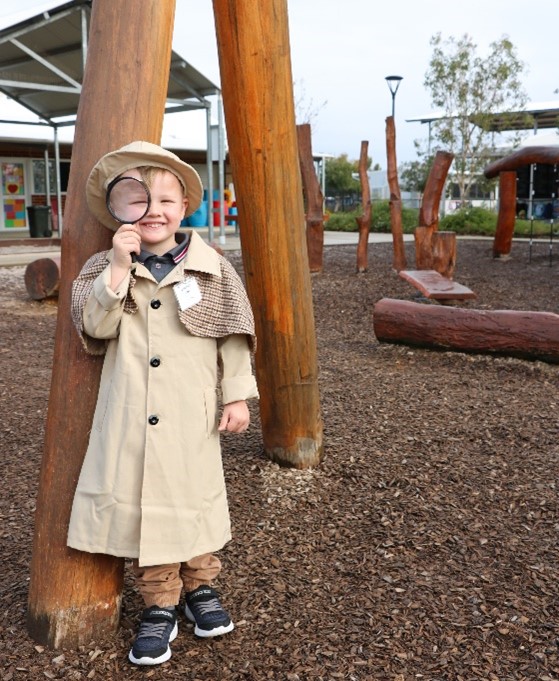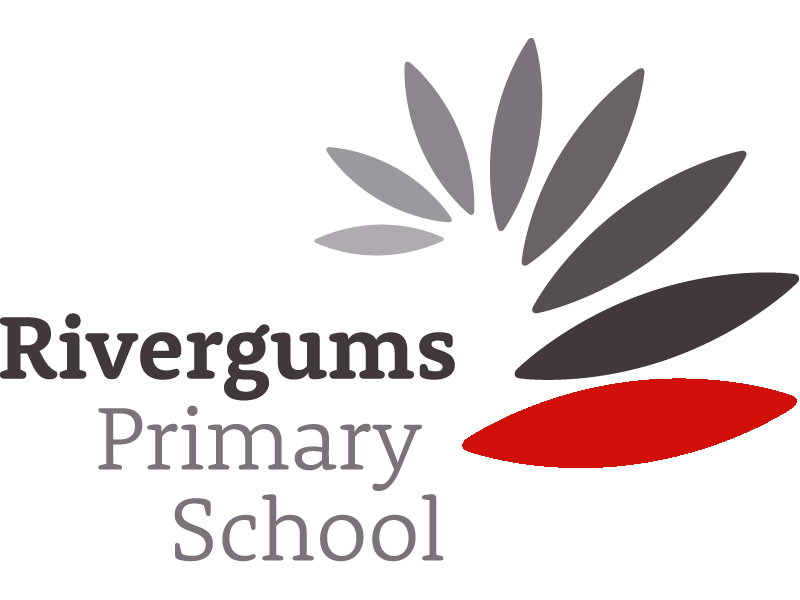Quick Links
English at Rivergums Primary School
Rivergums Primary School is committed to providing high-quality, evidence-informed programs to ensure all students have the opportunity to achieve the best possible literacy outcomes, including an appreciation of language and learning. Literacy skills are explicitly taught across Kindergarten to Year 6 through a collaborative, whole school explicit direct instruction approach. This ensures consistency and low variation across teaching, learning and assessment, enabling teachers to develop and provide targeted learning programs, implementing early interventions when required.
The teaching and learning programs are built around three interrelated strands of Language, Literature, and Literacy. Together these strands focus on developing students’ knowledge, understanding and skills in reading, writing, listening, speaking, viewing, and creating.
Reading
Reading is a multifaceted skill, gradually acquired over years of instruction and practice (Scarborough’s Reading Rope, 2001). As explained by the Simple View of Reading, learning to read requires two overarching abilities, correctly identifying words (decoding) and understanding their meaning (comprehension). Acquisition of these two broad abilities requires the development of more specific skills. An extensive body of research on reading instruction identified five essential skills for reading and that a high-quality literacy program should include all five components, including Phonemic Awareness, Phonics, Fluency, Vocabulary and Comprehension. These five components need to be explicitly taught, in addition to providing a strong foundation in oral language and a knowledge-rich curriculum.
Phonemic Awareness
At Rivergums Primary School teachers are providing high-quality teaching and learning to develop students’ phonological and phonemic awareness. Students engage in purposeful explicit phonemic awareness learning programs daily to develop their ability to recognise, understand, and manipulate the individual sounds in spoken words to ensure they become successful readers and writers. All students from Kindergarten through to Year 1 participate in daily Heggerty sessions. Students in Years 2 – 6 engage in one-minute phonemic awareness instruction involving manipulation and deletion.
Phonics
Phonics refers to the relationship between the 26 letters of the English alphabet and the 44 speech sounds they represent. Students in Kindergarten to Year 1 participate in daily Sounds~Write sessions. Students from Years 2 – 6 participate in Spelling Mastery, an explicit direct approach to spelling four days per week, and daily Morphology lessons from the Morphology Project.
Fluency
The National Literacy Learning Progression in the Australian Curriculum defines fluency as, “how a student becomes increasingly faster, smoother, more accurate and expressive in their reading aloud of progressively complex print texts. At higher levels of the progression, students demonstrate comprehension of a text through confident use of intonation, pausing, accuracy and pace” (Australian Curriculum & Assessment Reporting Authority). Fluency at Rivergums Primary School is modelled by teachers through explicit fluency instruction including choral and paired, repeated reading. Teachers explicitly teach pace, accuracy, volume, expression and self-correcting (PAVES). This is done using phonically controlled and challenging texts.
Vocabulary
Explicit vocabulary instruction is an essential component of developing the language and literacy skills necessary to succeed in school. A child’s vocabulary growth is directly linked to his or her overall school achievement. The more words a child knows, the more information the child has access to. (Beck, McKeown, Kucan, 2002). At RPS, vocabulary is explicitly taught through knowledge-rich units, writing and daily reviews. All students are exposed to a rich and demanding vocabulary with cross-curriculum integration.
Comprehension
Comprehension is the result of a student’s phonemic proficiency & decoding fluency, vocabulary, understanding of language structures, and background knowledge. At Rivergums Primary School, comprehension is explicitly taught through whole class teaching of knowledge-rich units, including the modelling of thinking that occurs to make meaning through Bloom’s Taxonomy and levelled questioning, close reading and Questioning the Author.
Daily Review
Rivergums Primary School strives to use the best, evidence-based teaching practices to maximise student achievement, with a focus on a clear format for effective Daily Review. These reviews take 10-15 minutes, usually at the beginning of a lesson. Literacy Daily Reviews are based on the structure Reteach, Retrieve & Apply and focus on specific aspects of content learned through our explicit literacy instruction and programs.
Reading Assessment
Reading is assessed through the Acadience Reading Assessment. This assessment is conducted three times per year and the data collected is used to inform further teaching. The data is analysed by classroom teachers and Administration to identify students at risk and the skills to be targeted at an instructional level. Students below the required benchmark are identified and their progress is monitored closely.
Writing
Writing instruction is explicit and evidence-based. Sentences are the building blocks of all writing and as a result, syntax is emphasised. At a whole school level, instruction is underpinned by ‘The Writing Revolution” (TWR).
Home Reading



